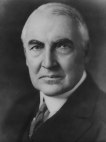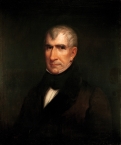After an exciting opening salvo by Benjamin Harrison and General Grant, the first round continues. How will your favorites fare??? Broken hearts ahead.
SOUTH REGION
5/2/14:
8) James Garfield vs. 9) George W. Bush
Motto: Both promised reform. Both were Republicans. Only one can survive.
Overview: The South region’s 8 vs. 9 matchup features two men promising reform. Garfield was never able to execute his mission while Bush’s early victories wore out their welcome.
The Matchup:
JG (1881)- Mr. Garfield represented many changes coming to Washington when he came into office in 1881. The Major General was the end of a long line of Civil War generals. In contrast to his predecessors, the idea of a platform specifically based on what he would do when President came into vogue. Garfield continued the Republican tradition. He staunchly supported Civil Service Reform, was an advocate for Freedmen, and was uniquely enshrined in history as the only sitting Congressman to be elected President. He started with a bang. He shamelessly appointed African Americans to federal offices, proposed far ranging civil service initiatives and stood up to powerful political bosses that dominated American politics. Then, it was over. On July 2, 1881, just months after being sworn in, Garfield was shot twice by Charles Guiteau. Amazingly, it would be not until mid-September that Garfield breathed his last. His presidency of 200 days is the second shortest in history. Tough to gauge but a solid leader was emerging.
GWB (2001-2009)- It can be a fools errand to try to analyze a Presidency that has so recently ended. Call me a fool. Like Garfield, Bush was a Republican looked to bring reform and change as a “unifer not a divider.” In the long campaign of 2000 with sitting VP Al Gore, Bush rarely spoke about Foreign Policy. The Domestic President was suddenly subsumed by it on September 11, 2001. From that day forward, President Bush was constantly viewed on his foreign policy vision for 21st Century America. Initially it was an overwhelming success. Riding a record 91% approval, Bush launched two wars in Afghanistan and Iraq by the time he was up for re-election. His leadership in a crisis was contagious as fierce critics almost unanimously supported both efforts. Bush could do no wrong and he rode his popularity past John Kerry in 2004. The second term got old on Americans. The overwhelming support eroded, congressional support waned and by the time 2006 midterms came around, the nation was against him. For the time being, the historical look at the Bush Presidency is to see a man hobbled by gigantic moments. He shone on 9/11 and in the pursuit of terrorist enemies. Those same moments ruined his stature most notably in the Hurricane Katrina disaster and a rapidly declining economy that consumed his last two years in office.
Bush fades into defeat. Garfield survives.
6) George H. W. Bush vs. 11) Warren G. Harding
Motto: One was a political mainstay. One was the anti-politician. Here we go.
Overview: Both Republicans presidents served in the 20th century but that is where their similarities end. The elder Bush took office in the late 1980s after years of Republican resurgence, Harding was promised as the man to normalize American again. He again has an uphill climb.
The Matchup:
GHWB (1989-1993)- If there was a checklist on federal positions to hold, Bush would have checked just about all of them. He served in Congress, the diplomatic front and headed the CIA for President Ford. His experience was impeccable and his addition to Ronald Reagan’s platform in 1980 ensured that his Presidency was a forgone conclusion. After Reagan handed over the keys in 1989, Bush set about ending the dwindling Cold War. Though Reagan is remembered for his fervent speeches at the Berlin Wall, it was Bush who was President when it came down. For the first time in decades the US President was truly the sole leader of the sole world power. His record on Civil Rights also added to his luster signing the 1990 Americans with Disabilities Act. Like his son, foreign policy eventually dominated his attention. In 1991, America became engaged in the Persian Gulf War. Unlike his son, America’s engagement was swift, brutal and decisive. America seemed unstoppable. Then, the economy tanked. Tanked so far that pesky young Bill Clinton was able to catch the elder Bush flatfooted, and he received the dubious honor of losing re-election.
WGH (1921-1923)- Harding promised a “Return to Normalcy.” Normalcy, though grammatically odd, promised all Americans that the rocky teens would give way to the high times of the 1920s. They were high times indeed. Despite the Volstead Act, specifically prohibiting alcohol in the nation, the Harding White House hummed with social extravagance complete with alcohol infused parties and late night soirees. Harding was finally sagged by his cronies. Though desiring an impressive cabinet to supplement his meager newspaperman background, Harding invited corruption and government malice almost immediately. Despite contemporaries generally liking the elder Ohio man, his cronies and the “Ohio Gang” produced scandal after scandal. Shady dealings including odd instances of suicide and blackmail made it clear that Harding was not the right leader to curtail the practices. Tea Pot Dome and the Justice Department were alone enough to cloud any Presidency of a reasonable plea of integrity. While on a trip in Alaska, Harding was shocked to read the extent of the scandals that were sure to end his presidency. Instead, the Alaskan trip proved to be his last as his succumbed to pneumonia on August 2, 1923, barely two years after taking office.
Read. My. Lips. Bush is the winner.
7) Gerald Ford vs. 10) William Henry Harrison
Motto: If you add them together, you still wouldn’t get a full term!
Overview: This 7 vs. 10 matchup features two men who served less than a full term. Harrison came from a long line of dominant heritage, Ford barely knew his abusive father, and forever took his stepfathers name.
The Matchup:
WHH (1841)- William Henry Harrison is the answer to many trivia questions. Yes, he is the only grandfather of a future president. Yes, he was a “Whig.” Yes, he became ill on the day of his inauguration and died only one month into it. It would be unduly harsh and unfair to criticize one month as President. However, it was quite clear that the aging war hero was not up to be President. Best known for his Indian victories, “Old Tippacanoe” moonlighted his life as a somewhat obscure politician from the frontier. He was plucked out of the fold in 1836 as the Whigs tried to duplicate Andrew Jackson by running a war hero determined to lead. One problem. Harrison was no Andrew Jackson. The 1840 election is roundly put down by historians as being unreasonably groveling to the lowest dominator. The campaign stopped across the country, handing out free booze and chanting impish insults at Martin “Van Ruin.” The result was indeed a war hero, but a war hero void of any bright ideas. From the inaugeral address, Harrison seemed hopelessly overwhelmed and under energized by his bullet points. His election was undoubtably destined to be a tool of Henry Clay and his admitted lack of economic knowledge puts heavy doubt of a successful presidency. His only official act was to veto a special session the nation so badly needed. On March 26th, his cold grew worse and soon he had passed away. At 30 days, 12 hours and 30 minutes, Harrison has the shortest presidency of all time.
GF (1974-1977)- Ford holds the distinction of never once winning election as either the president or vice president. After Nixon’s elected VP, Spiro Agnew resigned in 1973, seasoned Congressman Gerald Ford took the reigns of the highest office. Though lasting longer that his one month foe in Harrison, Ford quickly sealed his one term longevity by pardoning Richard Nixon in 1974, barely a month after taking office. The criticism was swift and ultimately insurmountable. Ford, a man inside the beltway known for integrity, was suddenly cast as the end of a shady bargain. Ford himself later claimed that this cost him re-election but that he had no regrets. Despite the opening explosive month, Ford’s 2+ years in office were somewhat effective. He was the first president to attack inflation head-on, eerily foreshadowing the doom as the 1980s began. He wisely continued Nixon’s thawing Cold War by extending agreements to stablize the world threats. He also became the first president since Eisenhower to lead an American force not inhabiting the nation of Vietnam. It was truly a global change. However, it was on foreign policy that sealed his fate. In a 1976 debate with Jimmy Carter, the first such debate since 1960, the nation all watched as Ford (incorrectly) stated, “There is no Soviet domination of Eastern Europe and there never will be under a Ford Administration.” Carter pounced and was able to ride this blunder into a narrow victory in 1976. Ford’s short presidency stood in contrast to his long life. At 93 years 165 days, he was the oldest President in history when he died in 2006.
Ford finishes what he started.










